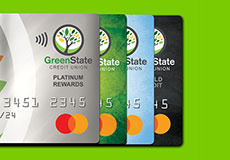Scam Alerts
The FTC has a helpful guide on how to spot spam text messages.
How To Recognize and Report Spam Text Messages | Consumer Advice (ftc.gov)
SIM Swapping / SIM Hijacking
SIM Swapping – also known as SIM hijacking, is a type of identity theft that generally occurs when victim receives a call from bad actor impersonating their mobile carrier. During the interaction, the bad actor collects several pieces of personal information, including PIN needed to access their mobile carrier’s account. Once these details are obtained, the bad actor contacts your mobile carrier, impersonating you, to request a SIM card replacement or transfer to a new device they control. When the “swap” occurs, scammers can intercept calls and texts, including two factor authentication codes used to access your accounts that use your phone.
Red Flags to look out for:
- Sudden loss of cell service
- Cannot send/receive texts or calls
- Locked out of your accounts despite entering correct credentials (email, online banking, social media, etc.)
Best way to protect yourself:
- Add a PIN or password to your mobile account and do not share with anyone
- Utilize SIM Protection with mobile carrier
If you are uncertain about who’s contacting you, the best way to protect your accounts and information is to hang up the call and contact your mobile carrier immediately. If you feel you have fallen victim to this type of scam, please contact GreenState via the information available on our website at greenstate.org or by calling GreenState’s main Member Assistance Center phone number (800) 397-3790.
Pig Butchering Scams
Pig Butchering Scams are when scammers build trust and a relationship with their victims over weeks or months. Scammers may initiate contact in different ways including "wrong number" text messages or phone calls, emails, or messages on social media platforms (Facebook, LinkedIn, etc). These scammers may pose as a potential friend, business partner, or romantic interest. The scammers ultimate goal is to convince you to invest in legitimate looking cryptocurrency platforms. These types of platforms are fake and controlled by the scammers who can manipulate the screen to make it appear like the investments are working. Once the victim has "invested" as much money as the scammer believes they're good for, the scammer steals all of the money.The term stems from the scammers fattening up their victims and convincing them to invest more and more as their earnings appear to double, but this is never the case.
Red Flags to look out for, if an 'online friend' begins discussing investments and crypto-related conversations, this is often a scam. If they mention 'quick returns', or promises of your investments doubling, or they recommend a specific app or platform for investing, this is a scam. If they aren't a certified Crypto broker, please stay wary.
If you feel you have fallen victim to this type of scam, please contact your local law enforcement officials and report the scam to the FTC.
Fraudulent Email Messages
We've received reports that some members are getting email messages asking them to click a link to approve or deny a pending transaction. These are scams and were not sent by GreenState.If you are uncertain about who's contacting you, the best way to protect your accounts and information is get in touch with GreenState directly via the information available on our website at greenstate.org or by calling the phone number on the back of your debit or credit card.
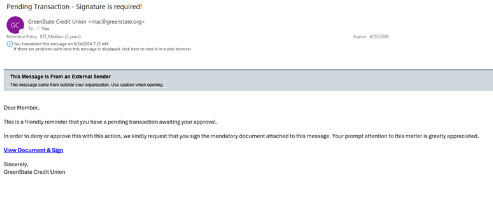
Scams that use Wires
You should only use wire transfers to send money to those individuals you trust or have reputable sources. Financial Institutions have seen an increase of wire transfer fraud in recent months.
The best way to prevent wire transfer fraud is by knowing the red flags. A few examples include: Sender places a rush request, only communicating via email, you don’t know the individual, online dating partner requests funds, request you to send funds saying your device is compromised
Fraudulent Phone Calls
We have received reports of phone calls where scammers claim to work for GreenState and say they’re calling to help resolve fraudulent charges on a debit or credit card. The scammers then provide instructions for resolving the issue by sending funds out via Zelle®.
This is a scam. GreenState will never ask you to resolve any matter by sending funds via Zelle®.
Zelle® transfers are for sending money to friends, family, or individuals who you personally know.
If you’re unsure about a phone call you received the best way to protect your accounts and information is to hang up the call (if you’re still on it) and contact GreenState directly via the information available on our website at greenstate.org or by calling the phone number on the back of your debit or credit card. GreenState’s main Member Assistance Center phone number is 800-397-3790, you can find additional numbers for support on our Member Support page.
Scams that use Zelle®
You should only use Zelle® to send money to those you trust such as friends or family members. Why? Because payments cannot be canceled once sent, if a recipient is already enrolled in Zelle®. Money moves directly into the enrolled recipient’s bank account within minutes.
Beware of payment scams. Offers that sound too good to be true probably are. As an example, if a stranger is selling you concert tickets at a steep discount and insisting that you pay with Zelle® it may be a scam. There is no purchase protection when using Zelle®. Only send money with Zelle® to people you know and trust.
Fraudulent Email Messages
We've received reports that some members are getting email messages asking them to click a link to verify their account or to verify a "recent request". These are scams and were not sent by GreenState.If you are uncertain about who's contacting you, the best way to protect your accounts and information is get in touch with GreenState directly via the information available on our website at greenstate.org or by calling the phone number on the back of your debit or credit card.
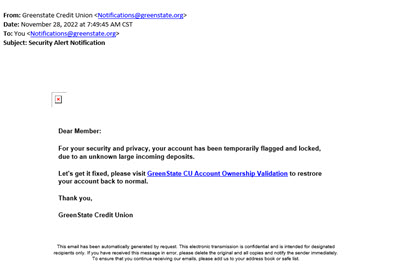
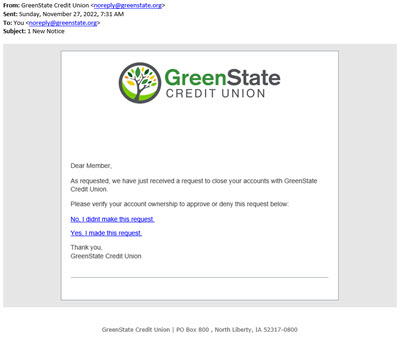
Fraudulent Phone Calls
We have received reports of phone calls to our members coming from an individual claiming to work for GreenState who say’s they’re calling about foreclosing on a mortgage and to please return their call.
If you’re unsure about a phone call you received the best way to protect your accounts and information is to hang up the call (if you’re still on it) and contact GreenState directly via the information available on our website at greenstate.org or by calling the phone number on the back of your debit or credit card. GreenState’s main Member Assistance Center phone number is 800-397-3790, you can find additional numbers for support on our Member Support page.
Fraudulent Text Messages
We've received reports that some members are getting text messages asking them to click a link to access to their account. This is a scam and was not sent by GreenState.If you are uncertain about who's contacting you, the best way to protect your accounts and information is get in touch with GreenState directly via the information available on our website at greenstate.org or by calling the phone number on the back of your debit or credit card.
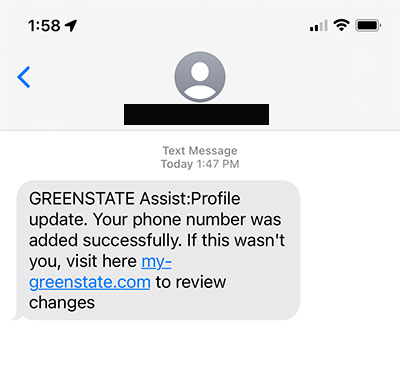
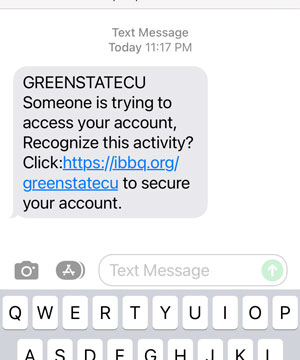
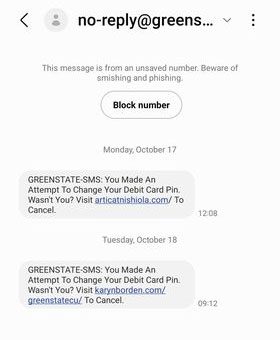
Fraudulent Phone Calls
We have received reports of phone calls to our members coming from “GreenState CU” with the caller stating there were pending charges and fraud was suspected. The caller then asks for a few of the numbers of your credit card to “verify your identity.” Never give out your personal information like member numbers and credit card numbers to any caller.
In the event of potentially fraudulent charges, GreenState may reach out to confirm charges, but will never ask you for your card, account or personal information. If you do receive a suspicious call or text, please call us at 1-800-397-3790.


